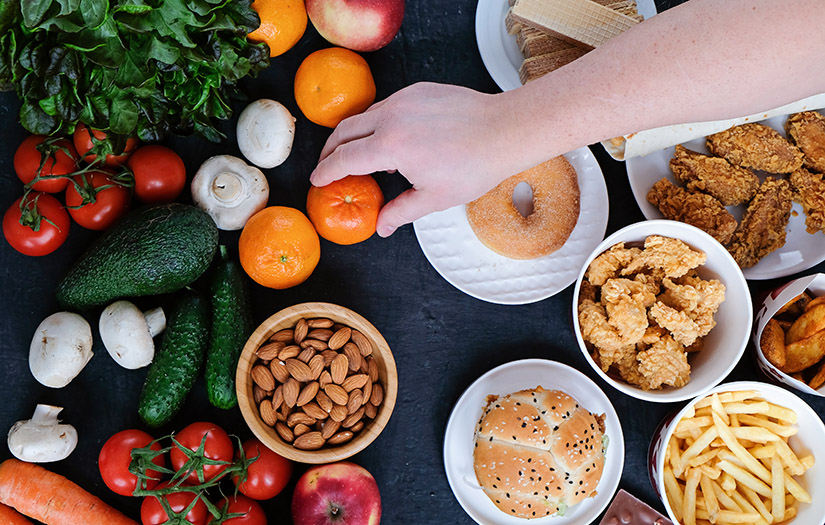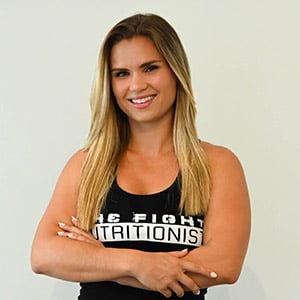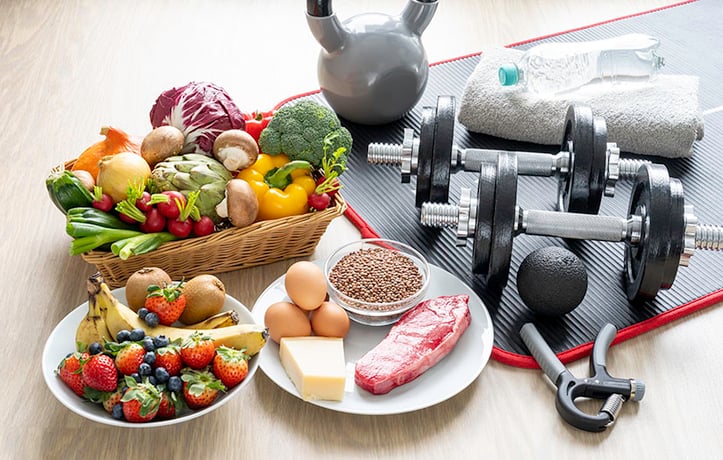听你的身体。了解真正的饥饿痛。饥饿时吃饭,吃饱了。
您是否曾经听过有人对您说这些话或它的版本?他们可能试图让您练习某种形式的直观饮食。
This concept is an important perspective to consider when beginning or continuing your nutrition journey.If you are coaching clients,理解概念a must.
世界卫生大会t is Intuitive Eating?
The term was first coined in 1995 and its purpose was to help health officials teach individuals struggling with weight management, body dissatisfaction, and disordered eating patterns a way to build a better relationship with food.
The fundamental principle behind intuitive eating is that the body knows exactly how much food it needs daily to properly nourish itself and maintain an appropriate weight. However, because of certain societal cues we learn growing up (i.e., clearing your plate to have dessert) we become numb to these intrinsic signals.
Therefore, intuitive eating is the practice of listening or becoming re-aware of our intrinsic hunger cues. With intuitive eating, no restrictions are placed on the amount or type of food one can consume — unless dictated by certain medical conditions or allergies. The philosophy behind no restrictions comes from the belief the body will naturally crave a variety of nutrients.
The Difference Between Intuitive and Non-Intuitive Eating
在我们深入了解直觉饮食之前,让我们首先介绍什么不是:
- Intuitive eating is not a fad diet (or any kind of diet)
- 直观的饮食不是减肥或体重管理的一种手段。这根本无关。
- Intuitive eating is not anti-health, anti-nutrition, anti-exercise, etc.
- 直观的饮食虽然涵盖了正念饮食的一部分,但不仅是正念的饮食。
- 直观的饮食并不总是适合所有人。实际上,如果您患有饮食失调症,饮食失调或节食悠久的历史,则很容易将直观的饮食和操纵为某种东西。*
Diets just do not work. Dietitians Evelyn Tribole and Elyse Resch realization of just that inspired them to research what did and write the bookIntuitive Eating,随着第一版于1995年出版。从那时起,他们发布了两个较新版本和一个以同名的工作簿。
So how does one begin to practice intuitive eating? By following these 10 principles, you can start your journey on building a better relationship with food.
The 10 Principles of Intuitive Eating
- Reject the diet mentality
- 尊重你的饥饿
- Make peace with food
- Challenge the 'food police'
- 感觉你的饱满
- 发现满意因素
- Cope with your emotions
- 尊重你的身体
- Exercise
- 尊重你的健康
#1拒绝饮食心态
饮食意味着一些短期或有限。世界卫生大会t is one to do after the diet is over? Research has repeatedly demonstrated that individuals on any extreme weight loss program do not maintain the weight loss for significant periods.
一旦这些人不再遵循严格的准则,这些人通常会恢复体重(或更多)。通过拒绝饮食心态,您开始将饮食变化视为可以长期维持的新生活方式习惯。
#2 Honor your hunger
在身体需要能量时学习真正的饥饿线索和饮食是直观饮食的关键。通常,个人会忽略这些内在的饥饿信号,这可能导致暴饮暴食。
#3 Make peace with food
直观饮食背后的理念是,您可以删除食物周围所有“不良”标签。例如,声称任何高脂肪或含糖甜点对您有害”。限制您的选择可以增强渴望,这可能会导致稍后无法控制的弯曲。如果您想食用特定的食物,那就去做。
#4挑战食品警察
这意味着您的内部食品警察,而不是朋友或家人对您的膳食选择发表评论。内部责骂食用甜品,并声称这一天将您的整个饮食放弃不利于与食物建立更好的关系。该原则是关于挑战与餐食选择相关的负面信念。
#5 Feel your fullness
学习何时真正饥饿,然后学习何时饱满。当您感到自己感到满足时,请停止食用。
#6发现满意因素
This principle is all about being in the moment and creating an inviting, enjoyable environment when eating. By increasing mindfulness, it can help increase satisfaction and satiation.
#7应对您的情绪
Learn how to eat for your physical well-being and not an emotional one. The focus of this principle is to learn how to deal with emotions and not use food as a coping mechanism. Very often individuals turn to food to cope with stress and/or anxiety. Most of these food choices are often concentrated in fats and sugars which can stimulate releases in dopamine, the "pleasure" hormone.
#8 Respect your body
Respecting your body is all about acceptance of your genetic blueprint. Learn to appreciate your features and size without coming up with unrealistic goals. For example, an individual that is 5'5" can't diet or train to become 6'0". Accept your body and learn to work with it, not against it.
#9 Exercise
这一原则不仅仅是燃烧卡路里,而是关于更健康生活的运动。此外,该原则鼓励个人在运动中练习正念。如果特定的练习带来积极的情绪,请以这些情绪作为继续活动的动机。
#10纪念您的健康
最后的原则是为您的身体提供所需的营养。虽然您不应该将自己限制在每一次放纵中,但重要的是要喂养身体各种水果,蔬菜,蛋白质,脂肪和全谷物。健康,均衡饮食的所有基本要素。
直观的饮食是创造实际变化的有用工具吗?
Well according to the research, many studies have shown intuitive eating is positively associated with healthier eating behaviors, various psychological health indicators, and can aid in some weight loss. However, one study claimed intuitive eating does not promote increases in physical activity or is a successful tool in aiding in significant weight loss. It had more success in maintaining weight over a long period.
因此,在养成更好的饮食习惯时,传统的卡路里限制比直觉饮食更有用?
To reduce body weight, more energy must be expended compared to the energy consumed. Therefore, purposeful calorie restriction to lose weight would be more beneficial than following the intuitive eating paradigm.
但是,就健康状况而言,一项研究评估了大学时代的节食者和直觉食客之间的饮食模式,发现每天消耗的水果和蔬菜的数量没有显着差异,从脂肪中消耗的卡路里,并且发现最直观的食客要么消耗的食物要么消耗他们的日常卡路里需要或略低于(4)。
Therefore, it was concluded in this review that intuitive eating had no effects on markers of health status when it came to food choices. This review, however, was conducted in a small college-aged population and may not serve as a useful study to compare to larger populations.
When we look at current diet culture, there is an extensive amount of misinformation and diet fads that only promise short-term success. They do not provide long-term and sustainable tips to tackle the true issues of body image dissatisfaction and poor relationships with food. In that sense, intuitive eating is a great tool to heal the psychological aspects of "diet culture".
许多研究表明与身体图像满意度相关,下BMIS,减少节食和饮食习惯。一些研究甚至表明,直觉饮食可以用作促进饮食失调诊所中积极治疗结果的工具(5,6)。
Overall, intuitive eating seems to foster positive changes in body image satisfaction and promote healthier relationships with food. While intuitive eating practices may not be the most viable solution for weight loss, it does seem to be an important tool in creating long-term success in any weight loss journey. Research has shown that intuitive eating is correlated with lower BMI's, more positive attitudes towards food, and better health outcomes since intuitive eating targets behavior and psychological change.
References
1。https://www.cambridge.org/core/journals/public-health-nutrition/article/review-article-relationships-between-intuitive-eating-and-health-indicators-literature-review/CBC03E81A54FBAAC49B2A8B2EC49631C
2。https://books.google.com/books?hl=en&lr=&id=gPGrAJWz7Z4C&oi=fnd&pg=PR9&dq=10+principles+of+intuitive+eating+scholarly+articles&ots=TkjY848xT2&sig=-e2AJaLBb0PwBOA8MjFdl5ZpEv4#v=onepage&q=10%20principles%20&f = false
3。https://www.sciendirect.com/science/article/abs/pii/s01956666315300635
4.https://digitalcommons.usu.edu/cgi/viewcontent.cgi?article=1099&context=Etd
5.https://www.tandfonline.com/doi/full/10.1080/10640266.2017.1279907?scroll = top&needaccess = True
6.https://onlinelibrary.wiley.com/doi/abs/10.1002/eat.23238

















